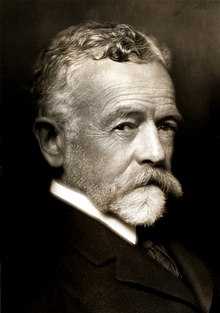
Back هنري كابوت لودج Arabic هنرى كابوت لودج ARZ هنری کابوت لاج AZB Henry Cabot Lodge Danish Henry Cabot Lodge senior German Henry Cabot Lodge Esperanto Henry Cabot Lodge Spanish هنری کابوت لاج Persian Henry Cabot Lodge Finnish Henry Cabot Lodge French
Henry Cabot Lodge | |
|---|---|
 Lodge in 1905 | |
| United States Senator from Massachusetts | |
| In office March 4, 1893 – November 9, 1924 | |
| Preceded by | Henry L. Dawes |
| Succeeded by | William M. Butler |
| Chair of the Senate Foreign Relations Committee | |
| In office May 19, 1919 – November 9, 1924 | |
| Preceded by | Gilbert Hitchcock |
| Succeeded by | William Borah |
| Senate Majority Leader | |
| In office May 19, 1919 – November 9, 1924 | |
| Deputy | Charles Curtis |
| Preceded by | Position established |
| Succeeded by | Charles Curtis |
| Chairman of the Senate Republican Conference | |
| In office August 17, 1918 – November 9, 1924 | |
| Preceded by | Jacob Harold Gallinger |
| Succeeded by | Charles Curtis |
| President pro tempore of the United States Senate | |
| In office May 25, 1912 – May 30, 1912 | |
| Preceded by | Augustus Octavius Bacon |
| Succeeded by | Augustus Octavius Bacon |
| Member of the U.S. House of Representatives from Massachusetts's 6th district | |
| In office March 4, 1887 – March 3, 1893 | |
| Preceded by | Henry B. Lovering |
| Succeeded by | William Cogswell |
| Chair of the Massachusetts Republican Party | |
| In office January 31, 1883 – 1884 | |
| Preceded by | Charles A. Stott |
| Succeeded by | Edward Avery |
| Member of the Massachusetts House of Representatives from the 10th Essex district[a] | |
| In office January 7, 1880 – January 3, 1882 | |
| Preceded by | Daniel R. Pinkham[1] William Lyon[1] |
| Succeeded by | John Marlor[2] |
| Personal details | |
| Born | May 12, 1850 Beverly, Massachusetts, U.S. |
| Died | November 9, 1924 (aged 74) Cambridge, Massachusetts, U.S. |
| Political party | Republican |
| Spouse |
Anna Cabot Mills Davis
(m. 1871) |
| Children | 3, including George |
| Relatives | |
| Education | Harvard University (AB, LLB, AM, PhD) |
| Signature | |
| This article is part of a series on |
| Conservatism in the United States |
|---|
 |

Henry Cabot Lodge (May 12, 1850 – November 9, 1924) was an American politician, historian, lawyer, and statesman from Massachusetts. A member of the Republican Party, he served in the United States Senate from 1893 to 1924 and is best known for his positions on foreign policy. His successful crusade against Woodrow Wilson's Treaty of Versailles ensured that the United States never joined the League of Nations and his penned conditions against that treaty, known collectively as the Lodge reservations, influenced the structure of the modern United Nations.[3][4]
Lodge received four degrees from Harvard University and was a widely published historian. His close friendship with Theodore Roosevelt began as early as 1884 and lasted their entire lifetimes, even surviving Roosevelt's bolt from the Republican Party in 1912.
As a representative, Lodge sponsored the unsuccessful Lodge Bill of 1890, which sought to protect the voting rights of African Americans and introduce a national secret ballot. As a senator, Lodge took a more active role in foreign policy, supporting the Spanish–American War, expansion of American territory overseas, and American entry into World War I. He also supported immigration restrictions, becoming a member of the Immigration Restriction League and influencing the Immigration Act of 1917.
After World War I, Lodge became Chairman of the Senate Committee on Foreign Relations and the leader of the Senate Republicans. From that position, he led the opposition to Wilson's Treaty of Versailles, proposing 14 reservations to the treaty.[3] His strongest objection was to the requirement that all nations repel aggression, fearing that this would erode congressional powers and erode American sovereignty; those objections had a major role in producing the veto power of the United Nations Security Council. Lodge remained in the Senate until his death in 1924.
Cite error: There are <ref group=lower-alpha> tags or {{efn}} templates on this page, but the references will not show without a {{reflist|group=lower-alpha}} template or {{notelist}} template (see the help page).
- ^ a b "A manual for the use of the General Court". 1858.
- ^ "A manual for the use of the General Court". 1858.
- ^ a b "The Great War: A Nation Comes of Age - Part 3, Transcript". American Experience. PBS. July 3, 2018. Archived from the original on May 20, 2019. Retrieved May 21, 2019.
- ^ Cite error: The named reference
:0was invoked but never defined (see the help page).